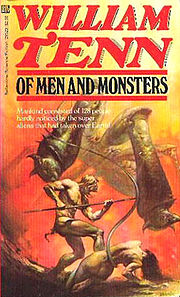The first word that comes to mind when I think of William Tenn is “wry.” He’s funny, he’s observant, he’s got a wonderful way of looking at things upside down, or putting two things together you’d never think of in the same universe, his stories are very different from each other, but you could find his picture in the dictionary next to the word “wry.”
Mankind consisted of 128 people.
If anyone else had written Of Men and Monsters, even as a comedy, it would be a cosy catastrophe. In Tenn’s hands it’s something else entirely. Of course, it’s very funny. The Earth has been utterly and completely conquered by aliens so long ago that the memory of the time before the aliens came is the province of religion. People live like vermin in holes in the insulation material of the walls of the homes the monsters have built, sneaking out to steal food. “Mankind” is the name of one of the front-burrow tribes.
No spoilers.
You could predict from this the kind of story it would be. And you’d be right, it is that kind of story—the young hero Eric the Only, going out on his first expedition into Monster territory, excitement, betrayals, captivity, escape, true love, happy ending. As it’s done as comedy, you might also predict that it would be a parody of that—which is also true. The book is simultaneously an adventure story taking itself seriously and a parody of an adventure story, played for laughs. It gets a lot of mileage out of of the idea of what intelligent mice or cockroaches would conclude about human houses. It makes jokes about the “cages of sin,” where prisoners are investigated by the monsters for pest control experiments—”The cages of sin is death!” “Are death?” There’s a religious schism that originated as an argument between people who thought the monsters should be thrown out with ancestral science or by stealing alien science, which people are fighting about though they’re making no progress against the monsters. A lot of the comedy comes from people behaving exactly the way people would behave in the kinds of situations they’re in, the kind of thing where you nod and smile rather than laughing. But beyond all this, it has an entirely unpredictable and unexpected ending—a happy ending, a funny ending, an emotionally satisfying ending, but an ending that’s typically, wryly, and exclusively Tenn.
I own a scruffy old British edition of Of Men and Monsters, but it’s presently in print in a gorgeous NESFA edition Here Comes Civilization that also contains some of Tenn’s short fiction. The rest of Tenn’s short fiction is available in the companion volume Immodest Proposals. Of Men and Monsters is his only novel-length work, most of his other stories are novellas. They’re all wry and funny and clever and they all do lovely surprising things with science-fictional ideas. People tend to talk about them as if they were jokes, and that’s what they are, long jokes told perfectly, with great punchlines and timely relevance. There’s the one about the amoeboid alien smut, and the one about the alien Jews, and the one about the way different groups of aliens keep liberating Earth until it’s too dangerous to use as a battlefield. That’s “The Liberation of Earth” and it was one of the first science fiction stories I ever read, in Penguin Science Fiction (edited by Brian Aldiss). If Tenn has a theme it’s “making the best of it.” The Earth has been conquered by monsters? Oh well, better make the best of it.
My son Sasha read Of Men and Monsters when he was twelve, young enough to entirely enjoy the adventure plot, and just old enough to appreciate the whole set of things Tenn was doing with the story. A few months after he’d read the book, I got to introduce Sasha to William Tenn (who is Phil Klass in private life) at a con, saying “You have a new generation of fans,” whereupon they both rolled their eyes at me in identical fashion and proceeded to bond about how embarrassing mothers can be. Anyway, I remember having a lot of great conversations with Sasha as he noticed various things the book was doing. He pointed out something I’d never noticed, that one of the precedents for this book was Mary Norton’s The Borrowers, and even more so Michael Larrabeiti’s parody The Borribles. Of course, he didn’t realise that The Borribles was written ten years later than Of Men and Monsters, so if there’s any influence it’s going the other way… but it is interesting that people living in walls like vermin is one of those things you see in children’s fiction but rarely in adult fiction. The only other SF book with this theme I can think of is Michael Coney’s The Hero of Downways, one of Coney’s weaker books.
All of Tenn’s work is worth your attention, it makes you smile, it makes you think, and best of all it makes you look at things in a different way.
Jo Walton is a science fiction and fantasy writer. She’s published eight novels, most recently Half a Crown and Lifelode, and two poetry collections. She reads a lot, and blogs about it here regularly. She comes from Wales but lives in Montreal where the food and books are more varied.










